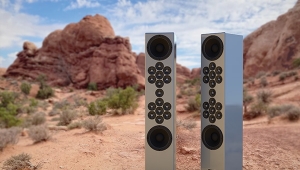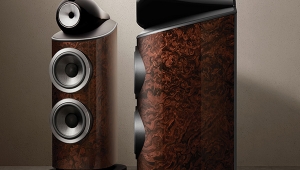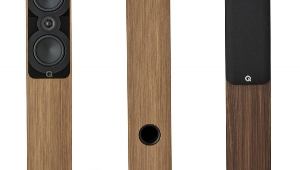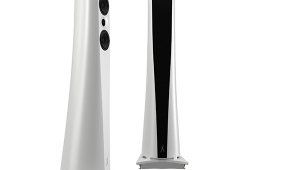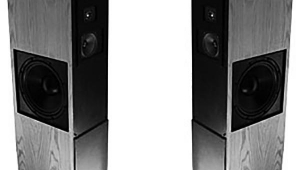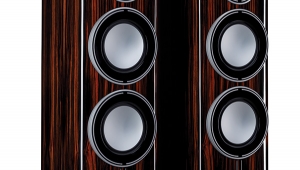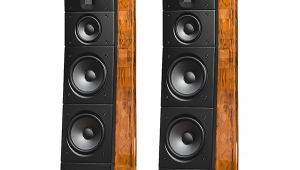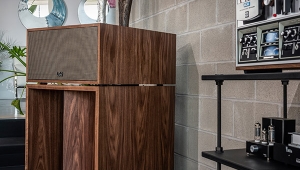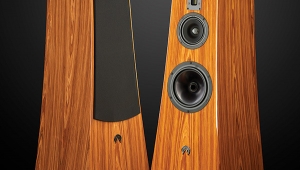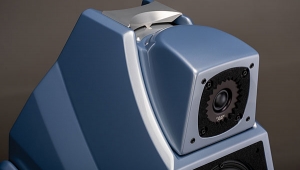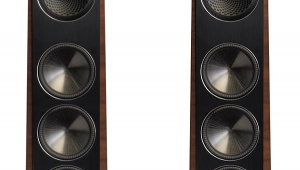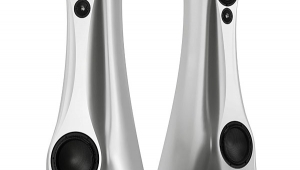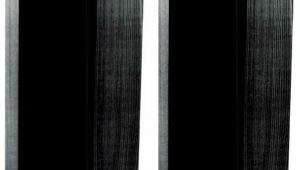| Columns Retired Columns & Blogs |
Thiel CS.5 loudspeaker Page 3
With the audio system in the room that now houses what passes for a "Home Theater" setup, I had been extremely underwhelmed by the spatial effects on this LP. I realize now that the primary reason for the ho-hum presentation was that that room was a nightmare for imaging, with a sliding glass door for the right wall, no wall for the left wall, a ceiling that slopes downward from left to right, a partial wall behind the speakers...I could go on, but you get the idea. But neither was I certain that part of the problem wasn't because it was an LP, not a CD, figuring that maybe those tricky effects were hard to press into vinyl.
Footnote 2: Said move was done quite a while before I started this gig, thankyouverymuch.
I hadn't played Amused to Death since I'd moved the audio stuff into the living room (footnote 2), which is a much better, closer-to-symmetrical space; so I thought I'd give it a spin on the Thiels. Oh, yeah! It worked! That dog was way out there to the right. Wait a second, was that really Rana, my neighbor's dog? No. When I replayed it, the bow-wow happened at the same time (and place). And the TV voices and the old guy talking about Bill Hubbard were to my left; that is, straight out to my side—in the hallway, in fact. Hey, who needs more than two speakers for surround-sound?
I put the Vandersteens back into the system to see how they would do with this wacky stuff; they did pretty well—much better than they did in that other room, but not as well as the Thiels. The dog was suitably far out to the right, but the TV voices were at a point between the left speaker and my extreme left, where the CS.5s put them.
But, of course, Amused to Death is material that's been electronically processed to simulate something more than stereo. How about something...stranger...less natural. Got it right here: Space-Age Bachelor Pad Music (Bar/None AHAON-043), a recent reissue collection (on cool blue vinyl) of tunes by the Mexican Carl Stalling, Juan Esquivel. Seems like a natural reviewer's tool—the liner notes say that the term "Space-Age Bachelor Pad Music" was coined by artist Byron Werner, who went on to describe the target market for Esquivel and his ilk as "lonely guys with too much disposable income who are nitpicky about their stereos." Sound like anyone you know? Me neither.
On "Latin-esque," the xylophone runs went from well outside the left speaker to beyond the right and back—enough to make you either smile or vomit, depending on your feelings about such gimmicky tricks (and your susceptibility to motion sickness). Staying firmly and reassuringly in-place, somewhat beyond the right speaker, was a piano, with some shakers ch-ch-ch-ing in the far left corner—both of these toward the back. Lest you think that this was taking the concept of "hole in the middle" to new heights, a bass guitar was dead center. Okay, so it's not a minimalist audiophile recording; but it sure as hell is fun! Try it—you might like it; and it really shows off that stereo that you're so danged nitpicky about.
Oh, all right, fun's fun, but how about some real music? How about The Buxtehude Project Volume I: Sacred Cantatas (PGM 102), which is a purist recording, featuring the Sarum Consort and the Chamber of St. Peter's in the Great Valley performing works of Dietrich Buxtehude (footnote 3)? The soloists were solidly placed across the stage, with the reverberation provided by the church venue filling the space between and around. Even though there were soloists to the left and right (as well as center), they didn't get locked-on to their respective speaker positions; these speakers really did disappear, which is good, because speakers should be heard and not seen.
Tone control
Tonally, there's really not much (bad) to say. The CS.5 struck me as being very neutral—except for the bass, which I'll get to in a minute; but I know what you're thinking: "Gee, aren't those Thiels kinda...that is, don't they have a tendency to...ah, what I mean is..." Oh great, now you're trying to be circumspect. But I know what you're thinking.
Conventional wisdom has it that Thiels can be a little harsh, a little hot, a little too forward. Remember what I said about leaving your preconceived notions outside? Leave them there. The CS.5s were anything but edgy. Detailed, yes—I got all the info that was there to be gotten—but this didn't translate to anything but a musically natural presentation. Another stereotype bites the dust.
But what if the Thiels are actually smoothing everything out? That wouldn't be cricket—or accurate, either. I hauled out The Proclaimers' Sunshine on Leith album (Chrysalis FV 41668), which had sounded bright and edgy to me in the past. Owwww...yeah, that still hurt, the Reid brothers voices on "I'm On My Way" sounding harsh and the cymbals like they were made of cellophane. I thought I ought to try the PSE Studio Two amp, just for completeness' sake. Noooo, that didn't help with the Proclaimers. Switching again to Alvin brother Dave, his voice was just a little bleached, but I still wouldn't quite call it harsh—I could listen to it all day, but I prefer the less electronic picture painted by the Audio Alchemy/Thiel partnership.
As for the bass: It was surprisingly good, given that the last octave and a half is missing. 'Lectric and 'coustic bass were both rendered well, with good power. The only nits to be picked were that 1) very low bass just wasn't there, and 2) on the lowest notes that were produced, the definition was a little loose.
Footnote 2: Said move was done quite a while before I started this gig, thankyouverymuch.
Footnote 3: And you just have to love the illustration on the back of the insert notes: an angel with a CD in her left hand wearing headphones, which are plugged-in to a Radio Shack CD-3400 carried in her right hand!
- Log in or register to post comments
